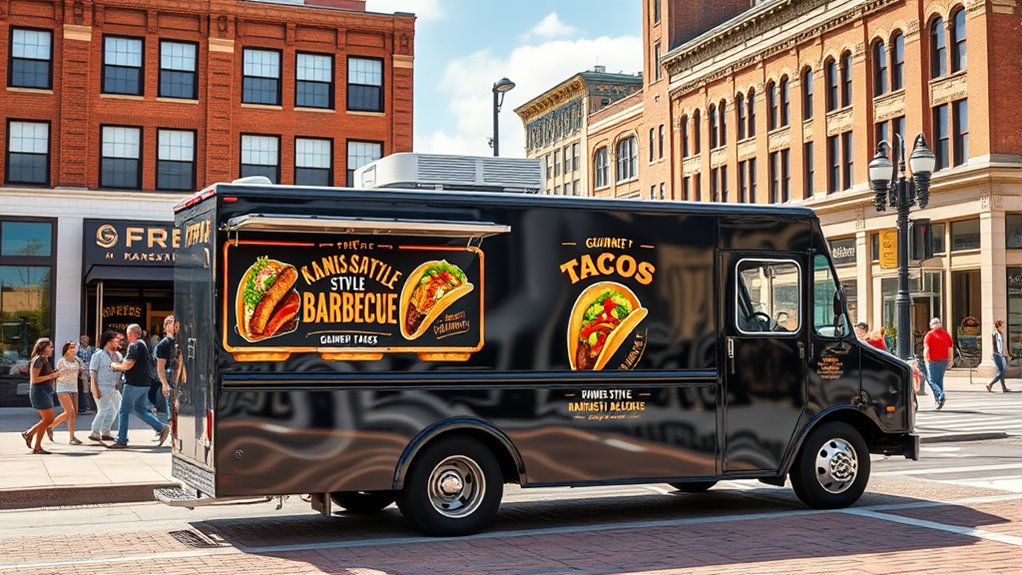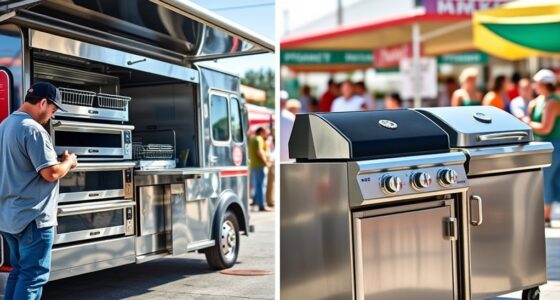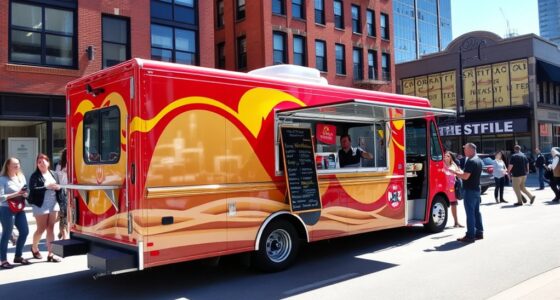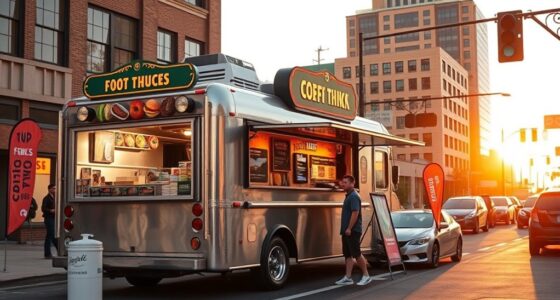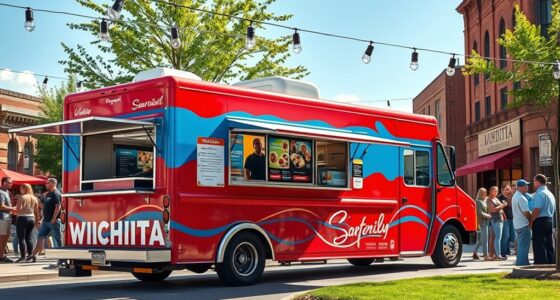To start your food truck in Kansas City, Kansas, you’ll need to secure permits like a Food Establishment License and a Food Vending Stand License, plus register your business. Costs vary, with used trucks around $30,000 and marketing up to $20,000 annually. Focus on private lots in busy districts and create a menu that meets health standards. Effective marketing on social media and participation in local events can boost your visibility—discover more insights to help your venture succeed.
Key Takeaways
- Obtain necessary permits including Food Establishment License and Food Vending Stand License from Kansas authorities.
- Budget around $30,000 for used trucks, $2,000–$3,000 for equipment, and $5,000–$20,000 for marketing.
- Focus on private property locations like B3, B4, M1, or participate in local events and festivals.
- Develop a compliant menu with proper food safety practices, temperature controls, and staff certifications.
- Use social media and community engagement to promote locations, build loyalty, and increase visibility.
Navigating Permits and Licensing Requirements
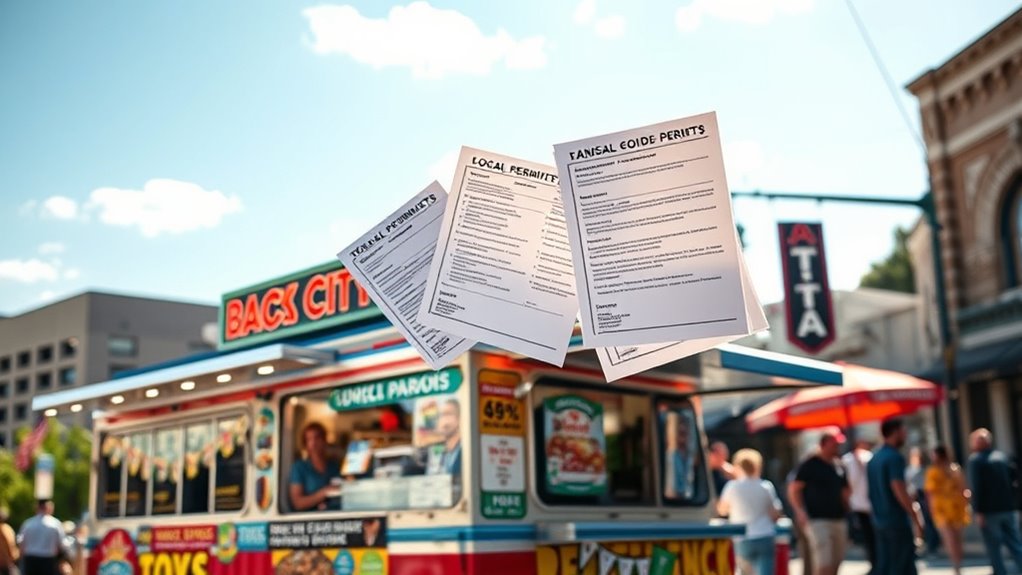
Navigating permits and licensing requirements is a crucial first step to launching your food truck in Kansas City. You’ll need a Food Establishment License from the Kansas Department of Agriculture if you plan to prepare and sell food for immediate consumption. Additionally, a Food Vending Stand License is required specifically for mobile vending units like food trucks. If you sell cereal malt beverages or non-alcoholic malt drinks, you must obtain a Cereal Malt Beverage License. Before applying, make certain your business entity is registered with the Kansas Secretary of State if operating as a Corporation or LLC. Local health departments will also require health permits, which involve submitting applications, passing inspections, and meeting sanitation standards. Planning and completing these steps early helps you avoid delays and guarantees compliance with Kansas City’s food safety regulations. Obtaining all necessary licenses ensures your business operates legally and avoids potential fines or shutdowns. Additionally, understanding local zoning laws can prevent future legal issues and help you select an appropriate location for your food truck.
Understanding Costs and Fee Structures
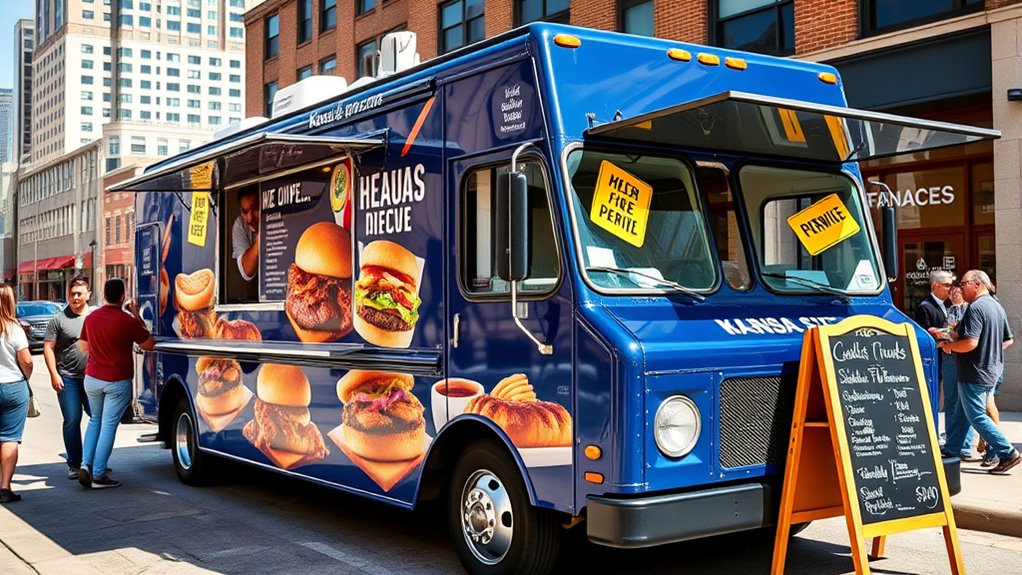
Understanding the costs and fee structures involved in launching a food truck in Kansas City is essential for planning a successful business. You’ll need to budget for your truck or trailer, with prices ranging from around $30,000 for used trucks to over $85,000 for new or customized models. Equipment and initial supplies can cost an additional $2,000–$3,000, while marketing expenses often start at $5,000–$20,000 in the first year. Permit and licensing fees vary, but Kansas City’s costs include health permits, business taxes, and commissary requirements. Operating expenses like commissary rental ($300–$1,500/month), maintenance, fuel, and insurance also add up. Labor costs, marketing investments, and event fees should be factored into your ongoing budget to guarantee long-term success. Additionally, understanding Relationships – Personality Test aspects such as effective communication and conflict resolution can help manage business partnerships and customer relationships more effectively.
Choosing Prime Locations and Operating Zones
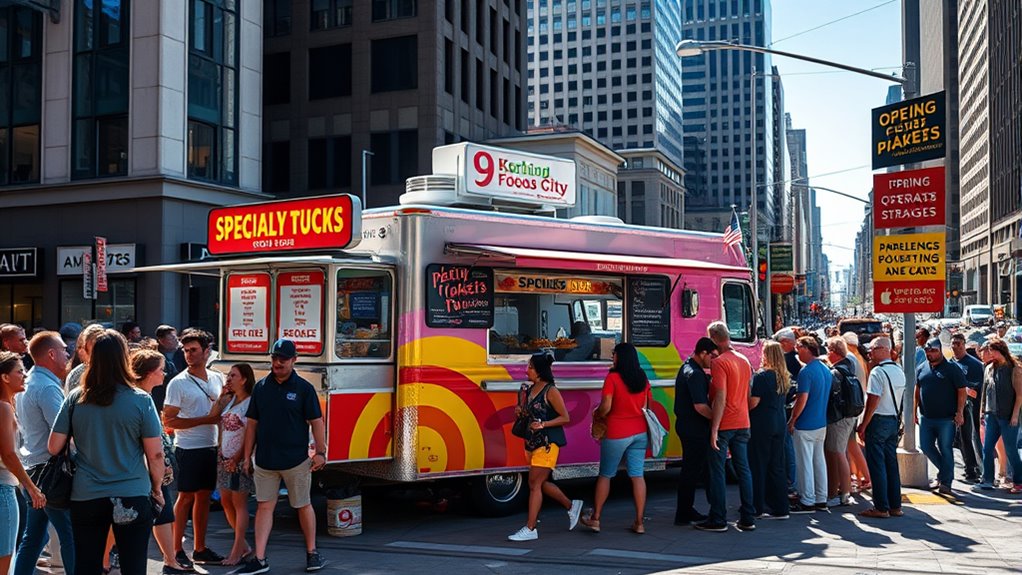
Choosing the right locations and operating zones can substantially impact your food truck’s success in Kansas City. Focus on private property within districts like B3, B4, M1, DC, and DX, where mobile vendor parks are allowed, offering infrastructure support. Public spaces are more regulated and often require permits, so private lots may provide greater flexibility. Target high-traffic commercial areas, downtown districts, and popular event venues to maximize customer flow. Seasonal events like farmers markets and festivals can boost sales but need temporary permits and coordination with organizers. Ensure your permits are aligned with your chosen location and schedule, as restrictions and fees vary. Proximity to utilities and commissaries simplifies operations, while visibility from major roads enhances branding and impulse sales. All mobile food vehicles require inspection to ensure safety and compliance, so choosing locations that facilitate easy access for inspections can save time and effort. Additionally, selecting areas with access to reliable utilities like water and electricity can streamline daily operations. Strategic location choice is key to thriving in Kansas City’s vibrant food scene.
Developing a Compliant Menu and Ensuring Food Safety
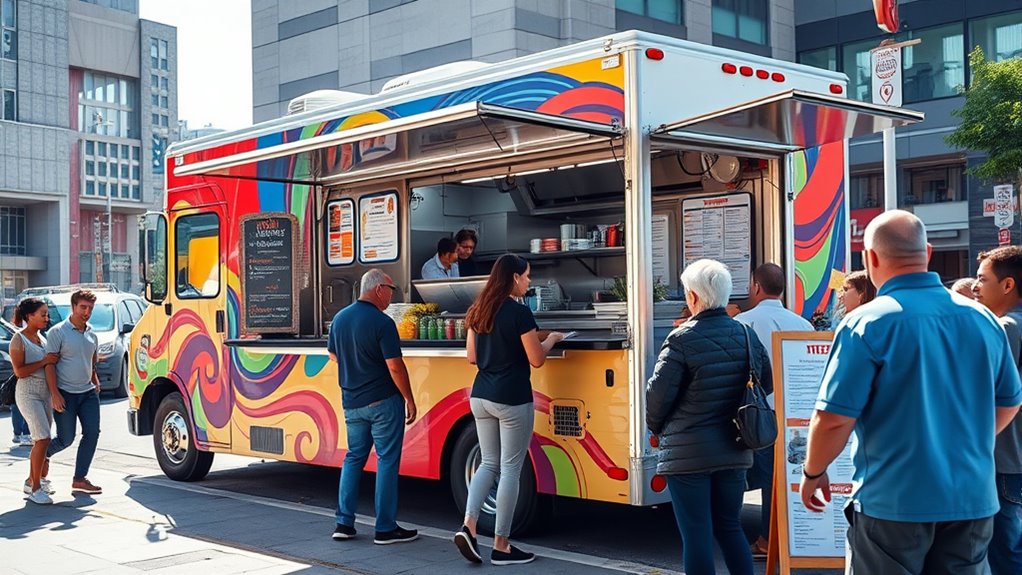
Developing a compliant menu and ensuring food safety are essential steps to operate a successful food truck in Kansas City. Your menu must meet Kansas Food Establishment License requirements, using approved ingredients and proper storage methods to prevent cross-contamination. Time and temperature controls are mandatory, especially for hazardous foods needing refrigeration at or below 41°F. Proper menu design facilitates safe handling and storage. You’ll need a valid Food Establishment License from the Kansas Department of Agriculture and may require food handler or manager certifications. Sanitation standards demand handwashing facilities, cleanable equipment, and approved storage, with regular cleaning and waste disposal. Strict adherence to cooking temperatures, avoiding cross-contamination, and maintaining detailed logs will help ensure your food remains safe and compliant at all times. Implementing regular staff training on food safety practices is also crucial to maintaining compliance and protecting customers. Additionally, understanding food safety regulations and keeping up with updates ensures your operation remains compliant with state and local laws.
Effective Marketing Strategies for Your Food Truck
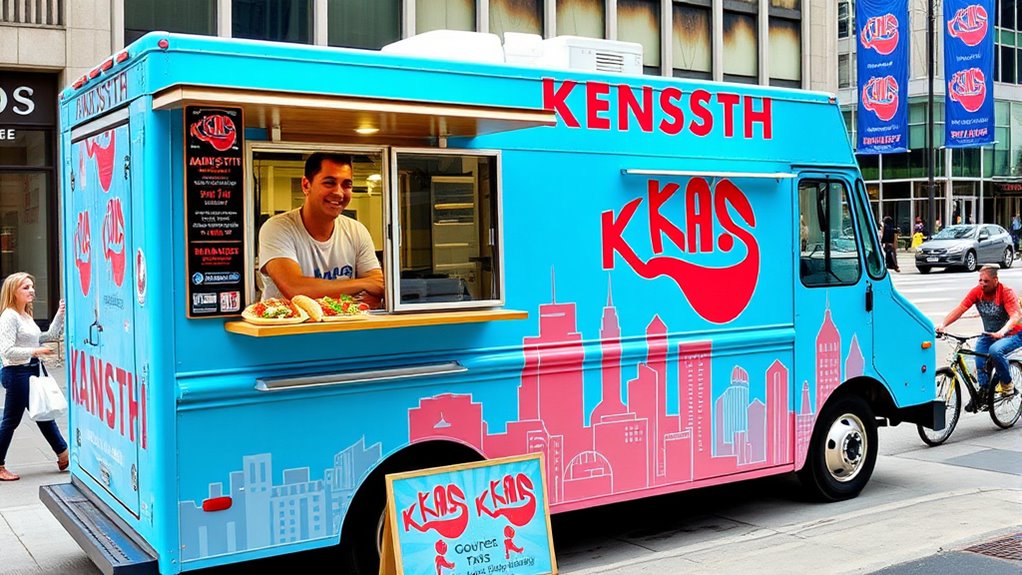
To attract more customers, you should focus on effective social media campaigns and active participation in local events. Using platforms like Facebook and Instagram can boost your visibility and sales, especially when combined with engaging community festivals. These strategies help build your brand presence and create loyal customers in Kansas City’s vibrant food scene. Additionally, incorporating eye-catching visuals into your marketing materials can significantly enhance customer engagement and interest.
Leverage Social Media Campaigns
Leveraging social media campaigns is essential for boosting your food truck’s visibility and attracting new customers. To do this effectively, create high-quality images and engaging videos of your menu items to draw attention and grow your audience. Keep your followers informed with regular updates about locations, menu changes, and daily specials. Consistency across platforms like Instagram, Facebook, and Twitter helps build brand recognition. Share behind-the-scenes content to personalize your brand and foster connections. Focus on platforms that appeal to your target audience—Instagram for stunning food photos, Facebook for promotions, and Twitter for real-time updates. Respond promptly to comments and messages, encouraging interaction. Use hashtags, location tags, and paid ads to expand your reach and attract more customers to your food truck. Utilizing analytics and insights allows you to refine your content strategy for better engagement and results. Incorporating audience engagement strategies can further enhance your marketing efforts and build customer loyalty.
Participate in Local Events
Participating in local events offers a powerful way to boost your food truck’s visibility and connect with the community. Attending community food festivals like Fountain Fest exposes your truck to thousands of potential customers, increasing brand recognition. To succeed, guarantee you meet event requirements such as valid health permits, insurance, and early setup. Here are some ways to maximize your results:
- Align your menu with family-friendly options and efficient service to handle high customer turnover.
- Build relationships with event organizers for promotional benefits, including social media mentions and featured spots.
- Choose strategic locations within events, like near popular attractions or high-traffic areas, to increase sales and foot traffic.
- Participate regularly in local events to establish a consistent presence, which helps build a loyal customer base and enhances your reputation within the community. Consistent participation also helps you optimize costs by spreading out your marketing efforts over time.
Participating consistently in local events helps establish your presence and grow customer loyalty over time.
Inspection Procedures and Maintaining Compliance
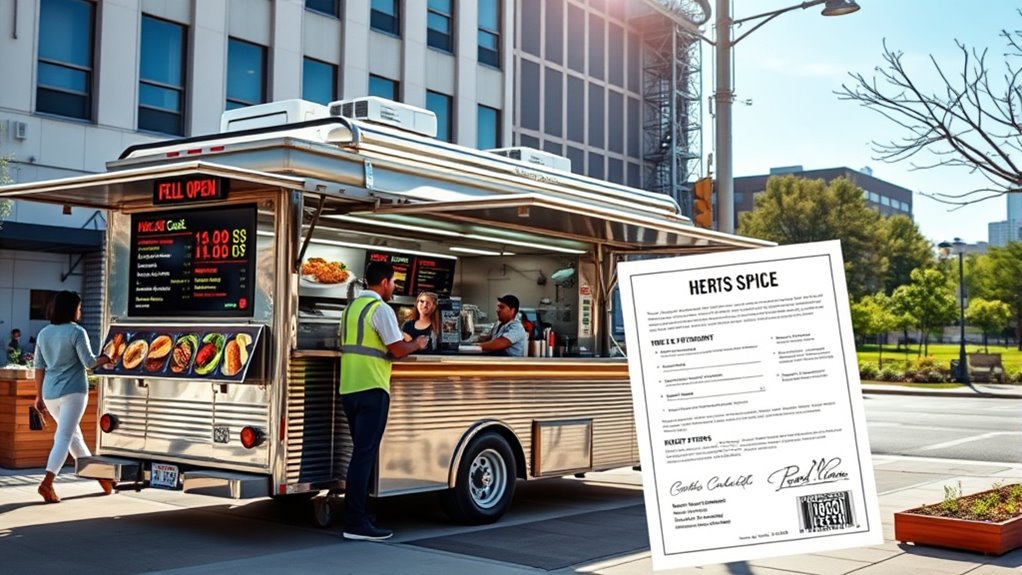
Understanding and following inspection procedures is essential for food truck operators aiming to stay compliant with local regulations. You should schedule inspections early with the relevant authority, like the fire or health department, and prepare the necessary packets, forms, and signatures. Incomplete paperwork can delay your approval. Inspections typically cover fire safety, such as fire extinguisher checks, emergency exits, and maintaining safe distances between units. They also assess sanitation, including food handling, cleanliness, and temperature controls, often requiring commissary agreements. Keep detailed records of all inspections, permits, training, and maintenance logs to ensure ongoing compliance. Regular self-inspections using official checklists help identify issues before official visits, reducing risks of violations and penalties. Incorporating industry trends into your procedures can help you stay ahead of potential compliance issues. Staying proactive guarantees your food truck remains compliant and ready for operation.
Frequently Asked Questions
How Long Does the Entire Permitting Process Typically Take?
The entire permitting process usually takes about 4 to 6 weeks. You should plan ahead by submitting all required documents early and ensuring your application is complete. Delays can happen if paperwork is missing or inspections are delayed. To keep things moving smoothly, contact inspectors proactively, respond quickly to requests, and schedule inspections promptly. Starting the process at least 30 days before your opening date helps prevent timing issues.
Are There Specific Restrictions on Operating Hours for Food Trucks?
Did you know that Kansas City, Kansas, temporarily bans food trucks in certain areas? You won’t find fixed, citywide operating hour limits, but local bans, seasonal moratoriums, and health-related curfews can restrict when you’re allowed to operate. You should stay alert to city announcements, as rules can change quickly. Permits often include specific hours, and violating these can lead to fines or license suspension, so always follow local guidelines.
Can I Operate a Food Truck Without a Fixed Location?
Yes, you can operate a food truck without a fixed location in Kansas City, Kansas. You need to obtain the proper permits, like a Food Establishment License, and follow local regulations. You’ll also need to coordinate with a commissary for storage and preparation. Use social media to share your daily locations, participate in events, and stay flexible with your schedule to attract customers across different areas.
What Insurance Coverage Is Required for Food Truck Operation?
You need to have the right insurance coverage to operate a food truck legally. Kansas requires at least $500,000 in general liability insurance, covering injuries and property damage, plus a valid certificate. Commercial auto insurance is mandatory to protect your vehicle on public roads. Optional coverages like equipment, liquor liability, or cyber insurance can also be helpful, depending on your services. Always make certain your insurance meets state requirements and is from a licensed provider.
Are There Financial Assistance Programs for New Mobile Food Vendors?
Did you know that over 60% of small businesses seek external funding? You’ll find several financial assistance programs for new mobile food vendors. Federal grants like the USDA Community Facilities program and SBA microloans support rural and startup ventures. Local options, such as Kansas City’s Revolving Loan Fund and Kiva Kansas City, offer low-interest and crowdfunded loans. These resources can help you launch and grow your food truck business.
Conclusion
Starting your food truck journey in Kansas City is like planting a seed—nurture it with permits, costs, and locations, and it’ll blossom into a thriving venture. Stay vigilant with safety and compliance, ensuring your roots remain steady. With each satisfied customer, you’re watering your dream, watching it grow stronger. Remember, your truck isn’t just a machine; it’s a vessel carrying your passion, transforming the city’s streets into a garden of flavors waiting to bloom.
